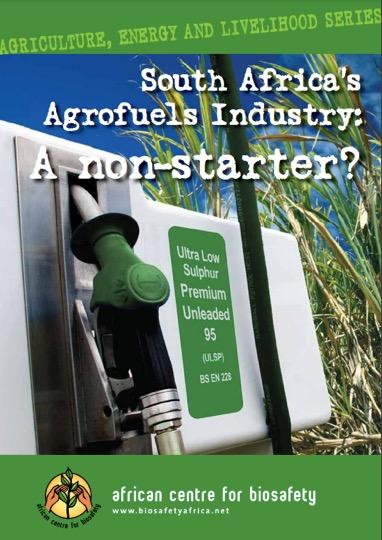Latest Resources

13 May 2011
HEAVY HANDS – Monsanto’s control in South Africa
This paper seeks to update an earlier report, published by the African Centre for Biosafety (ACB) in 2004, titled ‘A profile of Monsanto in South Africa’. In that paper we found that Monsanto dominated the GM crop market in South Africa and was using its considerable power to influence agricultural markets and debates in the […]

9 May 2011
Critique of SANBI’s Studies on Monsanto’s MON 810
During early in 2011, the South African National Biodiversity Institute (SANBI) published a report titled, Monitoring the Environmental Impacts of GM Maize in South Africa. The report was a culmination of a study by the Environmental Biosafety Cooperation Project (EBCP) aimed at developing a framework for monitoring of insect resistant maize, Mon810, belonging to Monsanto. […]

24 March 2011
South Africa’s Agrofuel’s Industry: A non-starter?
This paper provides a brief overview of the biofuels industry in the context of the South African government’s 2008 policy. Our key finding is that the large-scale biofuels industry has stagnated almost to the point of non-existence. There is, however, a growing impetus to address the shortcomings in government policy that has held the industry […]

9 March 2011
How US sorghum seed distributions undermine the FAO Plant Treaty’s Multilateral System
New data from ICRISAT and the US Department of Agriculture and a comparison of genebank records indicates that half of more of ICRISAT’s sorghum genebank collection is also being distributed outside of the Multilateral System. This yawning gap creates an economic incentive for the Multilateral System and its benefit-sharing requirements to be avoided. USDA’s sorghum […]

8 March 2011
Overview of GMO Regulatory Regime in South Africa
Following the promulgation of the Genetically Modified Organisms Act in 1997, numerous Genetically Modified Organism (GMO) applications have been approved in SA. As of 2007, GMOs commercially available in South Africa included insect resistant maize and cotton, herbicide tolerant cotton, maize and soybean, and herbicide tolerant and insect resistant cotton and maize, making up 62% […]

19 February 2011
Agrochemical giant DuPont to sell Bolivian sorghum gene
In 2012 multinational giant DuPont plans to begin selling sorghum varieties containing a valuable gene taken from a sudan grass that was collected in 2006 in Bolivia. The gene, branded as ‘Inzen A II’, makes sorghum plants tolerant to herbicides made by DuPont and other companies, and was acquired under exclusive license from Kansas State […]

16 February 2011
African Millet Under Threat
The African Centre for Biosafety (ACB) has focused several recent reports on new international commercial interest and patent claims on the African native crop sorghum. This includes the issues raised by the proposed widespread use of sorghum for the production of agrofuels. This report extends ACB’s examination of new international commercial interest in African native […]

4 February 2011
Sorghum and the Antioxidant Craze: What Benefit for Africa’s Farmers?
A highly successful health food company in the United States, Silver Plate Inc, is seeking to cash in on the health benefits of sorghum. More particularly, it has begun to commercialize foods rich in sorghum anthocyanins, natural “antioxidant” chemicals found in some strongly coloured plant foods that are believed to have heart and other health […]

31 January 2011
Water Efficient Maize for Africa: Pushing GM Crops onto Africa
This paper looks at the Water Efficient Maize for Africa (WEMA) project within the context of the race by massive agribusiness corporations to bring climate change related crops to the market. The first part of the paper explains the WEMA project within this context, outlining the players and the stakes involved. It looks at who […]

28 October 2010
Synthetic Biology in Africa: Recent Developments
By Gareth Jones and Mariam Mayet The focus of this paper is the emerging field of synthetic biology, in particular its implications for the African continent. Synthetic biology combines a number of scientific disciplines and is generally understood to involve the deliberate design of biological systems, using standardised components that have been created in a […]
